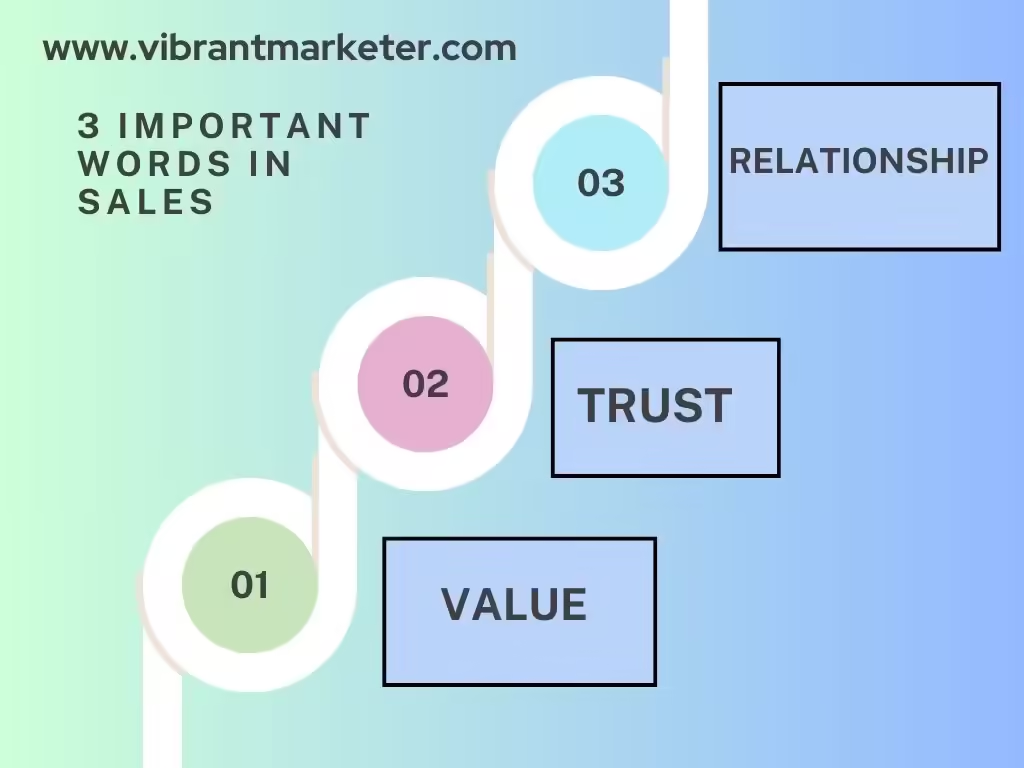
What are the Three Most Important Words in Sales?
Three Most Important Words in Sales

Let’s dive deep into each word, exploring what it means, why it’s important, how to embody it, and include real-world examples and insights from experts in the field.

1. Value
What It Is
Value in sales refers to the benefits that a product or service provides to a customer, relative to its cost. It’s not just about the price tag; it’s about how well your offering meets the customer’s needs and solves their problems.
Why It’s Important
According to a report from HubSpot, 62% of sales professionals believe that understanding customer needs is critical for closing deals. If customers perceive value, they are more likely to make a purchase and become repeat buyers.
How to Create Value
- Understand Customer Needs: Conduct thorough research to understand what your customers truly need.
- Tailor Your Pitch: Customize your sales pitch to highlight how your product addresses specific pain points.
- Use Testimonials and Case Studies: Showcase how your product has provided value to others in similar situations.
Real-World Example: Apple
Apple Inc. is renowned for its ability to communicate value. When introducing the iPhone, Apple didn’t just sell a phone; they sold a lifestyle. The sleek design, user-friendly interface, and ecosystem of apps added immense value beyond just calling and texting.
Strategies Used:
- Innovation: Apple continually invests in research and development to enhance product features that genuinely matter to customers, like improved battery life and camera quality.
- Marketing: Their marketing campaigns focus on how their products improve customers’ lives, not just the features of the products themselves. This approach helps customers see the value in their purchases.
Practical Tips:
- Active Listening: Always listen carefully to what customers are saying. This helps you understand their needs and present your product as a solution. Ask questions like, “What challenges are you facing?” to uncover deeper insights.
- Tailored Communication: Customize your sales pitch based on what the customer needs. For example, if a customer is looking for a phone primarily for photography, emphasize the camera features and capabilities.
Expert Insight
Tony Hsieh, the late CEO of Zappos, said, “Customer service shouldn’t just be a department, it should be the entire company.” This philosophy underlines the importance of delivering value at every touchpoint.
2. Trust
What It Is
Trust is the belief that a salesperson or brand will deliver on their promises. It’s the foundation of any successful sale and a critical component in long-term customer relationships.
Why It’s Important
Their is study from Edelman, they found that 81% of consumers need to trust a brand before making a purchase decision. Trust reduces perceived risk and increases customer confidence in making a decision.
How to Build Trust
- Be Transparent: Share both the pros and cons of your product honestly.
- Follow Through: Always deliver on your promises. If you say you’ll follow up, make sure you do.
- Gather and Display Reviews: Encourage satisfied customers to leave positive reviews, showcasing social proof.
Real-World Example: Amazon
Amazon has built its brand on trust. They are known for their customer-centric policies, like easy returns and reliable delivery services.
Strategies Used:
- Transparency: Amazon is upfront about shipping times, prices, and potential issues with products. They provide customer reviews and ratings, allowing potential buyers to make informed decisions.
- Consistency: Amazon ensures a consistent experience. Whether customers are shopping for books or electronics, they know they can expect the same level of service.
Practical Tips:
- Building Rapport: Find common ground with your customers. For instance, if a customer mentions they love reading, you can relate by discussing popular book recommendations. Showing genuine interest helps build a connection.
- Handling Objections Effectively: When customers raise concerns, listen attentively and address their fears calmly. For example, if a customer doubts the durability of a product, share statistics or testimonials that affirm its quality.
Example
Case Study: Salesforce, a leading customer relationship management (CRM) platform, emphasizes transparency and trust through customer reviews and case studies on their website. By sharing success stories from companies of all sizes, they build credibility and showcase their effectiveness.
Expert Insight
Marc Benioff, CEO of Salesforce, states, “The most successful companies in the future will be those that are trusted.” His emphasis on trust highlights its critical role in business.
Tip
Implement a system for gathering customer feedback and publicly display it on your website. This transparency can significantly enhance trust.
3. Relationship
What It Is
A relationship in sales is the connection between the salesperson and the customer, characterized by mutual respect and understanding. It goes beyond just one transaction and aims for a long-term partnership.
Why It’s Important
Research from Forbes shows that 80% of future profits will come from 20% of existing customers. Building strong relationships can lead to repeat business and referrals, which are crucial for sustainable sales growth.
How to Build Relationships
- Stay in Touch: Regularly follow up with customers, even after the sale.
- Provide Value Beyond the Sale: Share relevant information, tips, or resources that could help your customers succeed.
- Be Personable: Use their name, remember previous conversations, and show genuine interest in their needs.
Real-World Example: Salesforce
Salesforce has made relationship-building a core aspect of its business model. They offer extensive resources and support to their clients to ensure ongoing success.
Strategies Used:
- Customer Engagement: Salesforce hosts webinars and training sessions for clients, helping them maximize the use of their CRM software. This kind of engagement fosters a strong relationship.
- Feedback Loops: They regularly solicit feedback from clients to improve their services, demonstrating that they value customer input.
Practical Tips:
- Post-Sale Follow-up: After a sale, follow up with customers to thank them and see how they are enjoying the product. This could be as simple as sending an email or a quick phone call. This shows that you really cares about their experience and that can lead to repeat business.
- Long-Term Communication: Regularly share valuable content, such as newsletters or tips related to your product.
Example
Case Study: HubSpot is known for its relationship-centric approach. They provide extensive resources and support to their clients, ensuring that customers feel valued and understood long after the sale is closed.
Expert Insight
Brian Halligan, CEO of HubSpot, emphasizes, “People don’t buy products, they buy better versions of themselves.” This statement underlines the importance of understanding and fostering relationships with customers.
Conclusion: What are the Three Most Important Words in Sales
Remember, sales is not just about making a sale; it’s about building a legacy of trust and value through meaningful relationships. As you embrace these principles, you’ll find that sales become more enjoyable and rewarding—not just for you, but for your customers as well.
The next time you’re in a sales situation, keep these three words in mind: Value, Trust, and Relationship. They are not just words; they are the pillars of a successful sales strategy.






